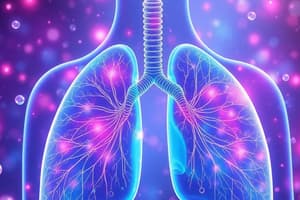Podcast
Questions and Answers
Why should patients avoid caffeine and caffeine-containing products when taking nasal decongestants?
Why should patients avoid caffeine and caffeine-containing products when taking nasal decongestants?
- To prevent increased blood pressure (correct)
- To prevent dehydration
- To prevent drowsiness
- To prevent stomach irritation
What is the primary function of the cough reflex?
What is the primary function of the cough reflex?
- To regulate breathing rate
- To initiate expectoration
- To remove excessive respiratory secretions (correct)
- To remove foreign objects from the respiratory tract
What type of cough is characterized by the removal of excessive secretions?
What type of cough is characterized by the removal of excessive secretions?
- Productive cough (correct)
- Dry cough
- Nonproductive cough
- Chronic cough
When is coughing potentially harmful?
When is coughing potentially harmful?
What type of drugs are used to stop or reduce coughing?
What type of drugs are used to stop or reduce coughing?
Why should patients report a fever, cough, or other symptoms lasting longer than 1 week?
Why should patients report a fever, cough, or other symptoms lasting longer than 1 week?
What is the role of sensory receptors in the respiratory tract in relation to coughing?
What is the role of sensory receptors in the respiratory tract in relation to coughing?
What is the primary difference between opioid and nonopioid antitussives?
What is the primary difference between opioid and nonopioid antitussives?
What is the primary nursing implication for patients taking nasal decongestants?
What is the primary nursing implication for patients taking nasal decongestants?
What is the primary benefit of coughing in most situations?
What is the primary benefit of coughing in most situations?
Flashcards are hidden until you start studying
Study Notes
Antitussives
- Used in cases when coughing is harmful
- Examples: Codeine, Hydrocodone
- Mechanism of action: Opioids suppress the cough reflex by direct action on the cough center in the medulla
- Also, they have analgesic and drying effects on the mucosa of the respiratory tract, increase viscosity of respiratory secretions, and reduce runny nose and postnasal drip
Non-Opioid Antitussives
- Examples: Dextromethorphan, Benzonatate
- Mechanism of action: Dextromethorphan works in the same way as opioids but has no analgesic properties and no CNS depression
- Benzonatate suppresses the cough reflex by numbing the stretch receptors in the respiratory tract and preventing reflex stimulation of the medullary cough center
Antitussives Indications
- Used to stop the cough reflex when the cough is nonproductive or harmful
Antitussives Contraindications
- Drug allergy
- Opioid dependency
- Respiratory depression
Antitussives Adverse Effects
- Benzonatate: Dizziness, headache, sedation, nausea, and others
- Dextromethorphan: Dizziness, drowsiness, nausea
- Opioids: Sedation, nausea, vomiting, lightheadedness, constipation
Antitussives Nursing Implications
- Perform respiratory and cough assessment and assess for allergies
- Instruct patients to avoid driving or operating heavy equipment due to possible sedation, drowsiness, or dizziness
- Report any of the following symptoms to the caregiver: Cough that lasts more than 1 week, persistent headache, fever, rash
Expectorants
- Aid in the expectoration (removal) of mucus
- Reduce the viscosity of secretions
- Disintegrate and thin secretions
- Example: Guaifenesin
Expectorants Mechanisms of Action
- Reflex stimulation: Drug causes irritation of the GI tract, leading to loosening and thinning of respiratory tract secretions
- Direct stimulation: The secretory glands are stimulated directly to increase their production of respiratory tract fluids
Expectorants Drug Effects
- By loosening and thinning sputum and bronchial secretions, the tendency to cough is indirectly diminished
Expectorants Indications
- Used for the relief of productive coughs associated with:
- Common cold
- Bronchitis
- Laryngitis
- Pharyngitis
- Coughs caused by chronic paranasal sinusitis
- Pertussis
- Influenza
- Measles
Expectorants Nursing Implications
- Increase fluids, if permitted, to help loosen and liquefy secretions
- Report a fever, cough, or other symptoms lasting longer than 1 week
- Monitor for intended therapeutic effects
Monoamine Oxidase Inhibitors and Sympathomimetic Nasal Decongestants
- Raise blood pressure
Nasal Decongestants Nursing Implications
- Patients should avoid caffeine and caffeine-containing products
- Patients should report a fever, cough, or other symptoms lasting longer than 1 week
- Monitor for intended therapeutic effects
Cough Physiology
- Respiratory secretions and foreign objects are naturally removed by the cough reflex
- Induces coughing and expectoration initiated by irritation of sensory receptors in the respiratory tract
Types of Cough
- Productive cough: Congested, removes excessive secretions
- Nonproductive cough: Dry cough, most of the time, coughing is beneficial, removes excessive secretions and potentially harmful foreign substances
Studying That Suits You
Use AI to generate personalized quizzes and flashcards to suit your learning preferences.




